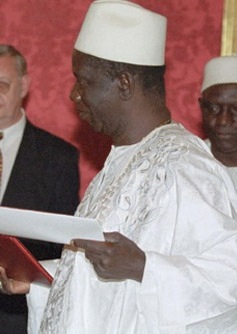An unprecedented declaration seeking to decriminalize homosexuality won the support of 66 countries in the United Nations General Assembly on Thursday, but opponents criticized it as an attempt to legitimize pedophilia and other “deplorable acts.”
The United States refused to support the nonbinding measure, as did Russia, China, the Roman Catholic Church and members of the Organization of the Islamic Conference. The Holy See’s observer mission issued a statement saying that the declaration “challenges existing human rights norms.”
The declaration, sponsored by France with broad support in Europe and Latin America, condemned human rights violations based on homophobia, saying such measures run counter to the universal declaration of human rights. “How can we tolerate the fact that people are stoned, hanged, decapitated and tortured only because of their sexual orientation?” said Rama Yade, the French state secretary for human rights, noting that homosexuality is banned in nearly 80 countries and subject to the death penalty in at least six.
France decided to use the format of a declaration because it did not have the support for an official resolution. Read out by Ambassador Jorge Argüello of Argentina, the declaration was the first on gay rights read in the 192-member General Assembly itself. Although laws against homosexuality are concentrated in the Middle East, Asia and Africa, more than one speaker addressing a separate conference on the declaration noted that the laws stemmed as much from the British colonial past as from religion or tradition.
Navanethem Pillay, the United Nations high commissioner for human rights, speaking by video telephone, said that just like apartheid laws that criminalized sexual relations between different races, laws against homosexuality “are increasingly becoming recognized as anachronistic and as inconsistent both with international law and with traditional values of dignity, inclusion and respect for all.”
The opposing statement read in the General Assembly, supported by nearly 60 nations, rejected the idea that sexual orientation was a matter of genetic coding. The statement, led by the Organization of the Islamic Conference, said the effort threatened to undermine the international framework of human rights by trying to normalize pedophilia, among other acts.
The Organization of the Islamic Conference also failed in a last-minute attempt to alter a formal resolution that Sweden sponsored condemning summary executions. It sought to have the words “sexual orientation” deleted as one of the central reasons for such killings.
Ms. Yade and the Dutch foreign minister, Maxime Verhagen, said at a news conference that they were “disappointed” that the United States failed to support the declaration. Human rights activists went further. “The Bush administration is trying to come up with Christmas presents for the religious right so it will be remembered,” said Scott Long, a director at Human Rights Watch.
The official American position was based on highly technical legal grounds. The text, by using terminology like “without distinction of any kind,” was too broad because it might be interpreted as an attempt by the federal government to override states’ rights on issues like gay marriage, American diplomats and legal experts said. “We are opposed to any discrimination, legally or politically, but the nature of our federal system prevents us from undertaking commitments and engagements where federal authorities don’t have jurisdiction,” said Alejandro D. Wolff, the deputy permanent representative.
Gay-rights advocates brought to the conference from around the world by France said just having the taboo broken on discussing the topic at the United Nations would aid their battles at home. “People in Africa can have hope that someone is speaking for them,” said the Rev. Jide Macaulay of Nigeria.
Source: New York Times
for more information see
UN declaration on sexual orientation and gender identity

 Captain Moussa Dadis Camara was named Wednesday as head of the military junta which claims to have seized power in Guinea, a statement read on national radio said.
Captain Moussa Dadis Camara was named Wednesday as head of the military junta which claims to have seized power in Guinea, a statement read on national radio said.
